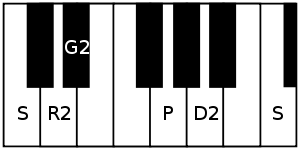Shivaranjani
Shivaranjani or Sivaranjani is a musical scale used in Indian classical music. There are two scales, one each in Hindustani music and Carnatic music. The Hindustani rāga is a pentatonic scale, while the Carnatic scale is an Audava - Audava] scale - 5 notes in the Arohanam and 5 in the Avarohanam.
| Thaat | Kafi |
|---|---|
| Arohana | S R g P D Ṡ |
| Avarohana | Ṡ D P g R S |
| Synonym | for example from which melakarta raga it is |
| Carnatic music |
|---|
Tanjavur-style Tambura |
| Concepts |
| Compositions |
| Instruments |
|
| Hindustani classical music |
|---|
| Concepts |
| Genres |
| Thaats |
Hindustani scale
The Hindustani rāga Shivaranjani belongs to the Kaafi thaat in terms of classification of the scale.[1] Its structure is as follows.
- ārohaṇa : S R g P D Ṡ[lower-alpha 1]
- avarohaṇa : Ṡ D P g R S[lower-alpha 2]
The komal(soft) gandhar(g) in place of shuddh gandhar (G) is the difference between this rāga and the global musical scale of Bhoop.
Borrowed into Carnatic music

This Hindustani scale is also the currently popular scale in Carnatic music. This scale is a janya rāgam (derived scale), as it does not have all the seven swaras (musical notes). It is a symmetric rāgam that does not contain madhyamam or nishadam. It is an audava-audava rāgam[2] in Carnatic music classification (audava meaning 'of 5'). Its ārohaṇa-avarohaṇa structure (ascending and descending scale) using swaras in Carnatic music notation is as follows.
- ārohaṇa : S R₂ G₂ P D₂ Ṡ[lower-alpha 3]
- avarohaṇa : Ṡ D₂ P G₂ R₂ S[lower-alpha 4]
(the variant notes used in this scale are chathusruthi rishabham, sadharana gandharam, chathusruthi dhaivatham other than the invariants shadjam and panchamam)
In this form, Shivaranjani is considered a janya rāgam of Kharaharapriya, the 22nd Melakarta rāgam, though it can be derived from 3 other melakarta rāgams, Gourimanohari, Hemavati or Dharmavati, by dropping both madhyamam and nishadam.
Popular compositions
Shivaranjani rāgam brings out karuna rasa (pathos) and lends itself for elaboration and exploration. It has many compositions in classical music and in film songs.
The popular Hindi film song Jaane kahan gaye woh din ("Where have those days gone") is based on this scale. Shivaranjani was a favourite of the legendary composers Shankar-Jaikishan (in fact, to be more precise, that of both Shankar and Jaikishan), in addition to the aforementioned song from Mera Naam Joker they also used it for O basanti pavan paagal ("O bewitching spring breeze") in Jis Desh Men Ganga Behti Hai and O mere sanam ("O my love") in Sangam Mere nainaa saawan-bhaado.n. Kannum Kannum from the movie Thiruda Thiruda ("Thief Thief") is regarded as the most different song done in this raga.
In Carnatic music, two ragamalikas (songs which have different stanzas in different ragas) start with a refrain in Shivaranjani. M S Subbulakshmi made Kurai onrum illai very popular which begins with this scale. Kurai onrun illai literally means "there is no defect" or "there is nothing left wanting", alluding to "we are satisfied and thankful" in prayer to "Kannan" (Lord Krishna). Another composition Muiyakka muiyakka, by Purandaradasa, also begins with this scale. Another famous composition in this raaga is 'Jagat janani' rendered in Tamil language.
Film Songs
Language:Tamil
Related rāgams
This section covers the theoretical and scientific aspect of this rāgam.
Graha bhedam
Shivaranjani's notes when shifted using Graha bhedam, yields 2 other pentatonic rāgams, namely, Sunadavinodini and Revati. Graha bhedam is the step taken in keeping the relative note frequencies same, while shifting the shadjam to the next note in the rāgam. See Graha bhedam on Shivaranjani for more details and an illustration.
Scale similarities
- Mohanam is a popular rāgam which has the antara gandharam in place of sadharana gandharam. Its ārohaṇa-avarohaṇa structure is S R2 G3 P D2 S : S D2 P G3 R2 S
- Abhogi is a popular rāgam which has the shuddha madhyamam in place of panchamam. Its ārohaṇa-avarohaṇa structure is S R2 G2 M1 D2 S : S D2 M1 G2 R2 S
Carnatic scale
The Carnatic scale Shivaranjani is a janya rāgam (derived scale) associated with the 64th parent scale Vachaspati (melakarta). It has vakra prayoga (zig-zag notes in its scale and note phrases) and its scale is as follows.[2]
- ārohaṇa : S R₂ G₃ M₂ D₂ P N₂ Ṡ[lower-alpha 5]
- avarohaṇa : Ṡ N₂ D₂ P D₂ M₂ G₃ R₂ S[lower-alpha 6]
Compositions
The compositions in this scale are:[2]
- Andavan anbe and Tarunamidaya dayai composed by Papanasam Sivan
- Jagat janani sukhapaani kalyani
- Maha Tripura Sundari Varnam composed by Madurai R. Muralidaran
Notes
- Alternate notations:
- Carnatic: S R₂ D₂ Ṡ
- Western: C D A C
- Alternate notations:
- Carnatic: Ṡ D₂ P S
- Western: C A G C
- Alternate notations:
- Hindustani: S R G̱ P D Ṡ
- Western: C D E♭ G A C
- Alternate notations:
- Hindustani: Ṡ D P G̱ R S
- Western: C A G E♭ D C
- Alternate notations:
- Hindustani: S R G M̄ D P Ṉ Ṡ
- Western: C D E F♯ A G B♭ C
- Alternate notations:
- Hindustani: Ṡ Ṉ D P D M̄ G R S
- Western: C B♭ A G A F♯ E D C
References
- Raganidhi by P. Subba Rao, Pub. 1964, The Music Academy of Madras
- Ragas in Carnatic music by Dr. S. Bhagyalekshmy, Pub. 1990, CBH Publications